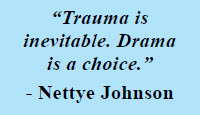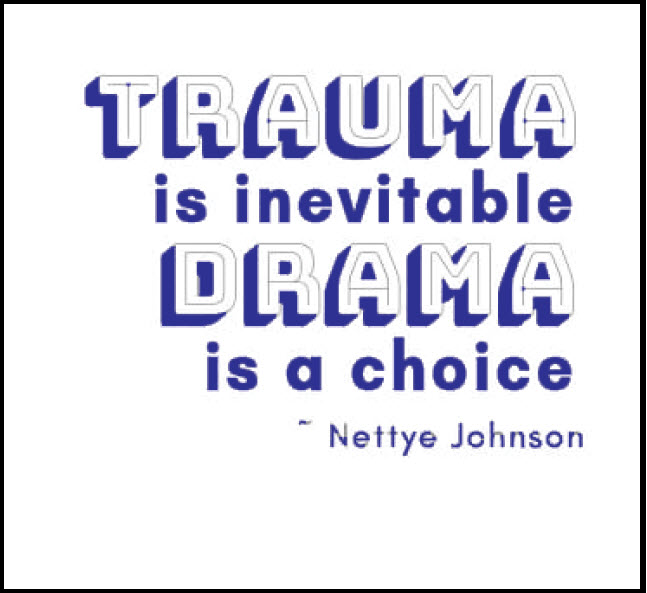 By: Lisa Philippart
By: Lisa Philippart
We all go through stressful experiences and everyday misadventures that can become a dramatic problem, depending on how we respond. There are some things to which we choose to react dramatically, even if they aren’t really dangerous or life-threatening. For example, situations like getting a bad grade or being offended by someone may elicit an “over-the top” response. Trauma is a more serious issue that can affect our mental and emotional health long after the event has occurred. When someone experiences trauma, it often involves violence, death, abuse, or threat of physical harm. Trauma involves a terrifying event, over which you have no control, and results in psychological changes that are long-lasting. Going through a traumatic event leaves behind mental and physical stress that makes it hard for the person to recover without professional help. Drama on the other hand consists of our personal reaction to things and the way that we interpret events that aren’t demonstrably painful. Drama is never an actual threat, even though it can feel like you are going through something quite intense. Drama is something we create.
 The interesting biological joke is that our primal brain can’t tell the difference between drama and trauma. Once the flight, fight, or freeze response is triggered, it’s all treated as a threat response. This mechanism is designed to protect us, but it also gives us a bias for seeing problems where they don’t exist. It takes wisdom and awareness to tell the difference between the two. Here is a helpful metaphor provided by Justin Foster:
The interesting biological joke is that our primal brain can’t tell the difference between drama and trauma. Once the flight, fight, or freeze response is triggered, it’s all treated as a threat response. This mechanism is designed to protect us, but it also gives us a bias for seeing problems where they don’t exist. It takes wisdom and awareness to tell the difference between the two. Here is a helpful metaphor provided by Justin Foster:
Drama is a mosquito in the tent. The mosquito takes all of your attention, but essentially contains zero actual threat. Our brains are flooded with how we feel about that annoying mosquito. That feeling determines our actions. Before you know it, we are swatting, flailing, and swearing, and the “problem” rarely gets solved. The real issue becomes our reaction, not the mosquito. Trauma is the grizzly bear outside the tent! This is a real and present danger. Our primal brain gets kicked into gear as we decide whether to fight, run, or freeze. You don’t initially feel the fear, as you try to survive. Trauma survivors report feeling intensely aware and calm during the attack. (The fear comes later in the form of PTSD.)
 So try this…the next time something feels like a problem or threat, ask yourself if it’s a mosquito or a grizzly bear. Often, unless it is life-threating, the “problems” are mosquitos. Even though your brain may react to drama in a similar way to a real threat, you can actually change your perspective to a more positive one. When it comes to drama, you can learn to cope with your feelings and see the situation as something you can handle. Trauma is different because often the mind and body become stuck in that traumatic experience. When you go through a drama, you are seeing a situation in a negative light and interpreting a relatively neutral event as a terrible experience. With trauma, you can hold the feeling in your body through uncontrollable symptoms, such as insomnia, nightmares, flashbacks, and other issues.
So try this…the next time something feels like a problem or threat, ask yourself if it’s a mosquito or a grizzly bear. Often, unless it is life-threating, the “problems” are mosquitos. Even though your brain may react to drama in a similar way to a real threat, you can actually change your perspective to a more positive one. When it comes to drama, you can learn to cope with your feelings and see the situation as something you can handle. Trauma is different because often the mind and body become stuck in that traumatic experience. When you go through a drama, you are seeing a situation in a negative light and interpreting a relatively neutral event as a terrible experience. With trauma, you can hold the feeling in your body through uncontrollable symptoms, such as insomnia, nightmares, flashbacks, and other issues.
With either drama or trauma, a therapist can help redirect your beliefs and thoughts about your own wellbeing. Cognitive behavior therapy can help you get out of a negative cycle that is causing difficulty coping with your daily life. Even though drama may not represent a mental health issue, it can also be worked through with talk therapy. Although trauma and drama are very different issues, they can both cause anxiety, depression, fear, and other painful feelings. Learning to recognize drama as your personal response to things can help reduce some of your reactions to situations. For those facing trauma, it is important to get treatment and talk to a professional to resolve and work through your feelings.
By: Lisa Philippart
Licensed Professional Counselor






